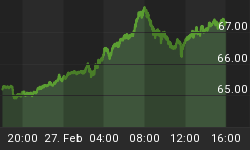An article Saturday included two what I think are very interesting PowerPoint Presentations. The first of these, titled '8 chokepoints threatening the world's key commodity supplies' - reading time 5 minutes - discusses the current events in eight countries that are and may continue to affect the prices of commodities those countries produce. The eight are (1) Cote d'Ivorie (Ivory Coast) - coaco, (2) The Democratic Republic of Congo - tin, gold, coltan, (3) Nigeria - oil, (4) India - coal, (5) Indonesia - thermal coal, (6) China - rare earth metals, (7) Russia - wheat, and (8) The Middle East and North Africa - oil.
That first PowerPoint Presentation links to a second titled 'A Brief Tour Of The 7 Oil Chokepoints That Are Crucial To The World Economy'. A map and write-up on the following 7 what are referred to as 'Oil Chokepoints'. The seven that are featured, with the number of million barrels per oil per day that flowed through them in 2009 are:
- The Strait of Hormuz, between Iran and The United Arab Emirates - 15.5 million bbl/d,
- Malacca, between Indonesia and Malaysia - 13.6 million bbl/d,
- The Suez Canal, between Eygpt and Saudi Arabia - 1.0 bbl/d,
- Bab el-Mandab, between Saudi Arabia and Sudan - 3.2 million bbl/d,
- Bosporus, in Turkey between the Black and Mediterranean Sea - 2.9 million bbl/d,
- The Panama Canal, in Panama between the Caribbean Sea and the Pacific Ocean - 0.8 million bbl/d, and
- The Danish Straits, between the Baltic Sea and the North Sea - 3.3 million bbl/d.
I recommend that if you have not given thought to these so-called commodity and oil 'chokepoints', or if you have but don't know precisely where geographically the ones related to oil are located, you ought to take the time to review these PowerPoint Presentations. I found them quite informative.
That said, these Presentations brought home to me once again the importance of understanding the country risk faced by resource companies operating in what are, or may become, less than stable from a political or economic point of view. If you need further convincing, read a recent article titled 'Ivory Coast On Brink Of Climactic Battle As Forces Fight Over Capital City' - reading time 3 minutes.















